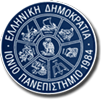Varna
Biographies and activity

Author: ROUSSEV IVAN
The brothers Nikola and Sava Georgievich. The moved to Varna from Tarnovo. In 1844 they established a company, which was originally engaged in commissioning and later with trade, too. The company stood in regular contacts with some of the biggest trading houses of the period: ‘N. Minchooglu & E. Selveli and company”, Tapchileshtovi Brothers (in the name of which it issued dozens of bills from 1853 onwards), ‘Geshovi Brothers’ etc., it carried out trading operations in Constantinople, Greece, Egypt (Alexandria). The company commanded the services of a ‘clerk’ (book-keeper) – a position that was occupied at some point by Hristo Popovich from Kalofer. In 1868 it suffered losses due to unsuccessful deals in Egypt. The older brother Nikola died in the same year. Because of the difficulties the company found itself constrained to cease work and to deposit its balance in the Commercial Court of Varna in order for its accounts with all its debtors and creditors to be squared. With this end in view a special announcement was published in the Dunav newspaper. In 1872 a new press release announced that Sava Georgievich re-opens the company, this time in partnership with the former clerk Hr. Popovich who would now take up the trade and the reception and consignment of ‘friendly goods’. The company survived only for a year – in 1873 it declared in the Pravo newspaper that the two merchants are separating and would continue their activities independently[1].
Rali h. Panayotov Mavridov (Mavridi). He was born in Shumen, in the 1840s he used to live and work in Constantinople, and moved to Varna in 1851 or 1852. In the next 10 years he worked in partnership with his brother Hristo (Hristaki) as their company was engaged in commissioning between Varna, Shumen, and Constantinople as well as with trade with colonial goods. The whole career of Mavridi was marked by modern undertakings – he created a couple of companies performing trade, commissioning, consulting, coin shipments; his partners were Bulgarians, Greeks, Armenians, Europeans; he initiated the establishment of a joint-stock company; he paid special attention to the trading and bookkeeping knowledge as he tried to provide for the translation from Greek into Bulgarian and the publication of a handbook of diplography (double-entry bookkeeping) for the needs of the trade in ‘Rumelia’ (for the Balkans and specifically for the Bulgarian lands) [2].
[1] Русев, И. Прояви на модерна организация и счетоводство в дейността на възрожденските фирми във Варна през XIX в. – Счетоводна политика, 2009, № 9–10, с. 50–64.
[2] Тонев, В. Рали х. П. Мавридов. – Българско възраждане. Идеи, личности, събития. Годишник на Общобългарския комитет „В. Левски”. Т. 3, 1998–2000, София, 2001, с. 95–108; Русев, И. Прояви на модерна организация и счетоводство в дейността на възрожденските фирми във Варна през XIX в. – Счетоводна политика, 2009, № 9–10, с. 50–64.
References
Bibliography:
Библиография:
Русев, И. Прояви на модерна организация и счетоводство в дейността на възрожденските фирми във Варна през XIX в. – Счетоводна политика, 2009, № 9–10, с. 50–64.
Тонев, В. Рали х. П. Мавридов. – Българско възраждане. Идеи, личности, събития. Годишник на Общобългарския комитет „В. Левски”. Т. 3, 1998–2000, София, 2001, с. 95–108;
Back




